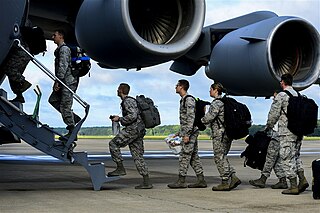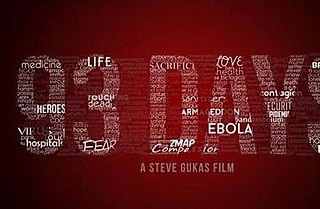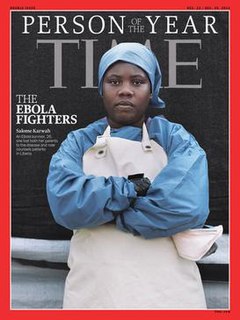
Tubmanburg, also known as Bomi and formerly known as Vaitown, is the capital of Bomi County in Liberia. It lies in the Bomi Hills northwest of Monrovia and was an iron ore and diamond mining centre until it was largely destroyed in the First Liberian Civil War. During the Second Liberian Civil War, it was the headquarters of the Liberians United for Reconciliation and Democracy rebel group. Most residents are members of the Vai tribe.

The Western African Ebola virus epidemic (2013–2016) was the most widespread outbreak of Ebola virus disease (EVD) in history—causing major loss of life and socioeconomic disruption in the region, mainly in Guinea, Liberia and Sierra Leone. The first cases were recorded in Guinea in December 2013; later, the disease spread to neighbouring Liberia and Sierra Leone, with minor outbreaks occurring elsewhere. It caused significant mortality, with the case fatality rate reported which was initially considerable, while the rate among hospitalised patients was 57–59%, the final numbers 28,616 people, including 11,310 deaths, for a case-fatality rate of 40%. Small outbreaks occurred in Nigeria and Mali, and secondary infections of medical workers occurred in the United States and Spain. In addition, isolated cases were recorded in Senegal, the United Kingdom and Italy. The number of cases peaked in October 2014 and then began to decline gradually, following the commitment of substantial international resources. As of 8 May 2016, the World Health Organization (WHO) and respective governments reported a total of 28,646 suspected cases and 11,323 deaths (39.5%), though the WHO believes that this substantially understates the magnitude of the outbreak.

Kent Brantly is an American doctor with the medical mission group Samaritan's Purse. While treating Ebola patients in Liberia, he contracted the virus. He became the first American to return to the United States to be treated for the disease.

An Ebola virus epidemic in Sierra Leone occurred in 2014, along with the neighbouring countries of Guinea and Liberia. On March 18, 2014 Guinean health officials announce the outbreak of a mysterious hemorrhagic fever "which strikes like lightning." It was identified as Ebola virus disease and spread to Sierra Leone by May 2014. The disease is thought to have originated when a child in a bat-hunting family contracted the disease in Guinea in December 2013. Consumption of African bushmeat, including rats, bats, and monkeys, is commonplace in Sierra Leone and West Africa in general.
Patrick Oliver Sawyer was a Liberian-American lawyer who was notable for being the index case for the introduction of Ebola virus disease into Nigeria during the West African Ebola epidemic. Sawyer was a naturalized U.S. citizen who lived in Coon Rapids, Minnesota. He has been variously described as working for the Liberian Ministry of Finance and for the mining company ArcelorMittal as their national manager for public health. He was aged 40 at the time of his death.

An epidemic of Ebola virus disease occurred in Liberia from 2014 to 2015, along with the neighbouring countries of Guinea and Sierra Leone. The first cases of virus were reported by late March 2014. The Ebola virus, a biosafety level four pathogen, is an RNA virus discovered in 1976.

Four laboratory-confirmed cases of Ebola virus disease occurred in the United States in 2014. Eleven cases were reported, including these four cases and seven cases medically evacuated from other countries. The first was reported in September 2014. Nine of the people contracted the disease outside the US and traveled into the country, either as regular airline passengers or as medical evacuees; of those nine, two died. Two people contracted Ebola in the United States. Both were nurses who treated an Ebola patient; both recovered.
Thomas Eric Duncan was a Liberian citizen who became the first Ebola patient diagnosed in the United States on September 30, 2014.

Organizations from around the world responded to the West African Ebola virus epidemic. In July 2014, the World Health Organization (WHO) convened an emergency meeting with health ministers from eleven countries and announced collaboration on a strategy to co-ordinate technical support to combat the epidemic. In August, they declared the outbreak an international public health emergency and published a roadmap to guide and coordinate the international response to the outbreak, aiming to stop ongoing Ebola transmission worldwide within 6–9 months. In September, the United Nations Security Council declared the Ebola virus outbreak in the West Africa subregion a "threat to international peace and security" and unanimously adopted a resolution urging UN member states to provide more resources to fight the outbreak; the WHO stated that the cost for combating the epidemic will be a minimum of $1 billion.

This article covers the timeline of the 2014 Ebola virus epidemic in West Africa and its outbreaks elsewhere. Flag icons denote the first announcements of confirmed cases by the respective nation-states, their first deaths, and their first secondary transmissions, as well as relevant sessions and announcements of agencies such as the World Health Organization (WHO), the U.S. Centers for Disease Control (CDC), and NGOs such as Doctors Without Borders; medical evacuations, visa restrictions, border closures, quarantines, court rulings, and possible cases of zoonosis are also included.

Operation United Assistance is a 2014 United States military mission to help combat the Ebola virus epidemic in West Africa, including the part of the epidemic occurring in Liberia. The 101st Airborne Division headquarters was responsible for leading the mission.
The following lists events that happened during 2014 in Sierra Leone.

Senate elections were held in Liberia on 20 December 2014, with half the seats in the Senate up for election.

Cases of the Ebola virus disease in Nigeria were reported in 2014 as a small part of the epidemic of Ebola virus disease which originated in Guinea that represented the first outbreak of the disease in a West African country. Previous outbreaks had been confined to countries in Central Africa.

93 Days is a 2016 Nigerian drama thriller film directed and co-produced by Steve Gukas. The film recounts the 2014 Ebola outbreak in Nigeria and its successful containment by health workers from a Lagos hospital. It stars Bimbo Akintola, Danny Glover and Bimbo Manuel with joint-production through Native FilmWorks, Michel Angelo Production and Bolanle Austen-Peters Production.
The cinema of Liberia, or Liberian cinema, refers to the filmmaking industry in Liberia. Liberian cinema has played an important part in Liberian culture and in recent years has begun flourishing again after the civil war.

Salomé Karwah was a Liberian nurse who was named co-Person of the Year by Time magazine in 2014 for her efforts to combat the West African Ebola virus epidemic. She appeared on the cover of Time in December 2014 with other health care workers and colleagues working to end the epidemic. Karwah survived ebola herself, before returning to work with Médecins Sans Frontières to help other patients afflicted with the disease. The actions of Karwah and other health care professionals are believed to have saved lives of thousands. However, two years later, Karwah died from complications of childbirth; her widower suggested that this might have been due to the widespread, mistaken belief that ebola survivors can still transmit the virus. Even before the ebola outbreak, Liberia had one of the highest rates of maternal mortality in the world.
Eternal Love Winning Africa Hospital is a hospital in Liberia located in the capital city Monrovia. It holds 85 beds and is operated by the SIM Company. It was established in 1965 This hospital continued its operations during the Ebola epidemic and civil wars.
St. Joseph's Catholic Hospital is a Christian-run hospital which was established in 1963. It serves everyone around the community in Liberia. The hospital does not charge for providing services to its clients. It is a not for profit institution.
Fatu Kekula is a Liberian woman who was a nursing student during the Ebola virus epidemic in Liberia. Four of her family members became ill and could not access medical care in a hospital. She improvised a "trash bag method" that would allow her to care for her family members without becoming ill herself. Three of her family members survived the epidemic, and Kekula herself did not contract the virus. The trash bag method has been recognized as a relatively simple and accessible way for people to protect themselves in an epidemic if they cannot get treatment in a hospital.













